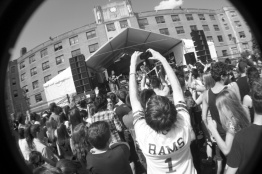The fanfare that currently surrounds Spring Weekend has not always existed. In the earliest days of the Spring Weekend tradition, Weekend Activities Council struggled with poor attendance and a $3,500 budget.
Fordham University’s Spring Weekend has evolved significantly since its inception. The original festivities included Boarders’ Weekend, in reference to Fordham’s commuter student population, which made up the majority of the student body. Despite its name, the festivities were open to both residents and commuters.
Christopher Rodgers, dean of students, said that festivities like Spring Weekend are important to universities, as they are not only a source of entertainment, but also an opportunity for the university to collaborate internally and build connections within departments.
“Here in our community, students will see hundreds of professional staff, undergraduate staff, student volunteers and colleagues from inside and outside of student life working all week to make our own Spring Weekend happen this year,” said Rodgers.
However, Rodgers said students should treat all elements of the celebration with respect.
“Judging by the tremendous growth in attendance over the decades, students clearly treasure this Fordham tradition,” said Rodgers. “But we carefully manage events with colleagues in Public Safety, Health Services and our student FUEMS to balance the celebratory with common sense and safety.”
Some festivities in Spring Weekend history were disrupted by various incidents. In 1978, Boarders’ Weekend was disrupted by fights between Fordham students and residents in the Bronx community, allegedly caused by negligent security.
The “Boarder Council,” the student organization in charge of the festivities at the time, said the extra security hired failed to check identifications of those entering campus, while Security Director, Thomas Courtney, denied that negligence. New York City Police “were called to the scene by students who were dissatisfied with the performance of IBI security guards in breaking up fights,” said The Fordham Ram 1978. “The incident has evolved into a controversy with accusations made by both students and security.”
1979’s Boarders’ Weekend began with clashes between the Boarder Council and Assistant Dean of Students Michael A. Machado. The Fordham Ram detailed the controversies surrounding the almost three hour long debate, which discussed the funding of Boarders’ Weekend and the scheduling of events.
Machado suggested moving the concert to Murphy Field to prevent problems encountered in the past, such as noise complaints from the library and “vandalism, fights and robberies” in Martyrs’ Court.
In 1980, the name of the weekend festivities was changed and Fordham held its first annual “Spring Weekend”. Residence Halls Association held athletic competitions and supplied both music and beer on Martyrs’ Court lawn. The event was open to all students, but the mixer cost six dollars for non-resident students.
The 1981 Spring Weekend saw the first annual RHA “Spring Semi-Formal,” which would later become the Under The Tent dance. The dance was themed “Moonlight Magic” and held on Spellman Lawn, next to Keating Hall. RHA also sponsored a rock band called Gabis, and the first concert on Martyrs’ Court lawn was celebrated that year.
Up until 1989, the university had a more lax alcohol policy, and student organizations served alcohol during Spring Weekend, but this tradition ended when the university’s rule changed.
That year’s Spring Weekend was also the first to utilize a Spring Festival Committee, which was a departure from the previous fractured planning between RHA, Weekend Activities Council, United Student Government and other student groups.
Chris Spearing, College of Business Administration ’87, said a lot of the outdoor activities were popular, but that the semi-formal did not have high attendance when he was a student.
“There was lots of frisbee, lots of coolers, lots of blankets,” said Spearing. “I think we had a comic on Friday night and a concert on Saturday night. The semi-formal was not super popular.”
Spearing also said a lot of the groups who performed at Fordham during his time there, both during Spring Weekend and at other events, were rock oriented. He listed performers such as Southside Johnny, the Ramones and singer Billy Idol.
“My wife would say Fordham has always been pretty good at putting on a party,” said Spearing.
Liz Moyse, FCRH ’88, Spearing’s wife, said she enjoyed Spring Weekend during her time at the university.
“I remember it being a pretty big deal. There were events scheduled all throughout the weekend,” said Moyse. “There were a lot of off-campus events. I looked forward to it, because you knew the end of the school year was approaching and finals were coming.”
More recently in Spring Weekend history, administrators and student leaders have begun to warn students against raucous behavior during the festivities. Then Dean of Student Life, Vice President of Student Affairs Jeffrey Gray advised students in 1993 to “use discretion” in order to maintain the end of the year celebration for subsequent years.
The Fordham Ram also describes various security and safety protocol in 1993 that are similar to various protocol used today, such as increased security personnel throughout campus and in residence halls.
The 2000s saw a departure from rock music and tended more towards alternative and indie artists. Twenty One Pilots performed for the university in 2015 and was preceded by Cold War Kids in 2014 and Grouplove in 2013.
The university continues this trend with the 2016 Spring Weekend group, Matt and Kim. The duo makes music that is a fusion of indie and dance music, similar to that of Twenty One Pilots.
This trend towards smaller, indie artists can be attributed to the size of the Campus Activities Board (CAB) budget.
The organization is allocated $174,000 a year for their functions, which often prevents the university from enlisting high profile performers.
Consequently, when artists garner fame quickly, CAB has to make rapid changes. After Foster the People’s song “Pumped Up Kicks” reached national airwaves in 2012, CAB could no longer afford the group and had to quickly book the rapper Jay Sean, said The Fordham Ram.





